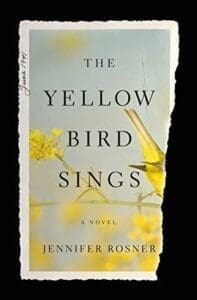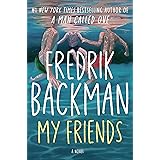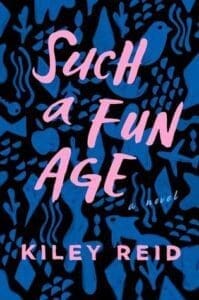The Yellow Bird Sings by Jennifer Rosner – 304 pages
Finished copy from Flatiron Books in exchange for an honest review
Book Blurb:
As Nazi soldiers round up the Jews in their town, Róża and her 5-year-old daughter, Shira, flee, seeking shelter in a neighbor’s barn. Hidden in the hayloft day and night, Shira struggles to stay still and quiet, as music pulses through her and the farmyard outside beckons. To soothe her daughter and pass the time, Róża tells her a story about a girl in an enchanted garden: The girl is forbidden from making a sound, so the yellow bird sings. He sings whatever the girl composes in her head: high-pitched trills of piccolo; low-throated growls of contrabassoon. Music helps the flowers bloom. In this make-believe world, Róża can shield Shira from the horrors that surround them. But the day comes when their haven is no longer safe, and Róża must make an impossible choice: whether to keep Shira by her side or give her the chance to survive apart.
My Review: 4.5 stars
The Yellow Bird Sings will forever be one of my favorites among Holocaust related fiction. On the surface, this is a story of pain and survival, but at its heart, it’s a story of love between mother and daughter. Throughout the entire novel, music is an underlying theme that connects the two, no matter how far apart they are.
Shira, at just five-years-old, is a bright child whose vivid imagination helps her cope amid the fifteen-month silence she endures. She creates an imaginary bird to sing and play in all the ways she cannot. Her mother simultaneously whispers bedtime stories about a young girl and her bird who always outwit the danger that surrounds them. Their situation will pull at your heartstrings. They are being hidden from a death camp where all of their family has perished, yet this barn offers minimal safety, and only for so long.
When they are separated, the book follows each of their paths and how they spend every moment searching for one another. In both of their stories they find mistreatment and hardship, but it is stymied by moments of kindness and concern. While apart, everything from second chances at love, becoming a musical prodigy, forging friendships, overcoming illness, embracing other religions, endless searching and the resistance camps are fleshed out. For whatever reason, the book reads quietly. Perhaps it’s the poetic prose, or the silence that encumbers it; I’m not sure. There are many books that I’ve described as a “quiet read”; I wish I had a better way to articulate my meaning.
Interestingly, this story was inspired by a woman the author met at a book event who survived WW2, by being hidden and silenced. Rosner has written a memoir, about being a mother to her deaf daughters and a children’s book that weaves together a Jewish folktale with a disabled character. This is her first foray into adult fiction; she is a fresh voice to this genre and has hit the mark on creating a compelling story that readers and book clubs will devour.
Quotes I liked:
She lie’s unmoving like a stone. Music storms inside her in movements dark and gloomy, but she shows no outward signs: no tapping fingers, no bobbing feet. She doesn’t scratch her itches. She holds back every sneeze. She doesn’t even whisper to her little bird, who is viciously pecking at his left foot, try to make himself like the other, outside birds.”
“The imprint of Shira’s fingers still pressed upon her arms; the shrill tone of Shira’s voice rang on in her ears. Shira had clung to her and Roza had pried her off. Finger by tiny finger. Róża felt flayed, a layer of herself ripped and taken-“
“In God’s eyes your child is no different than mine. She deserves every chance to live.”


















